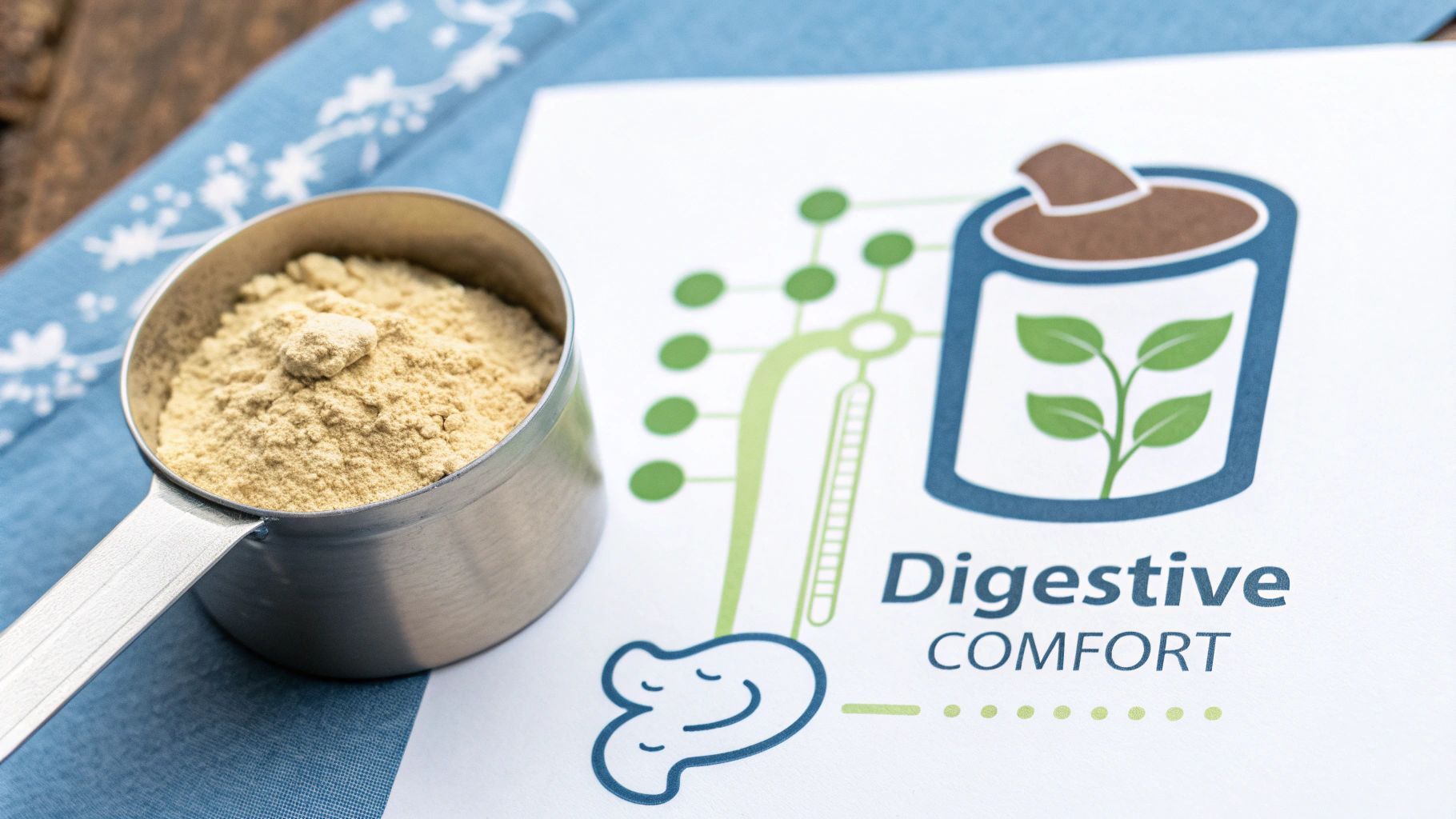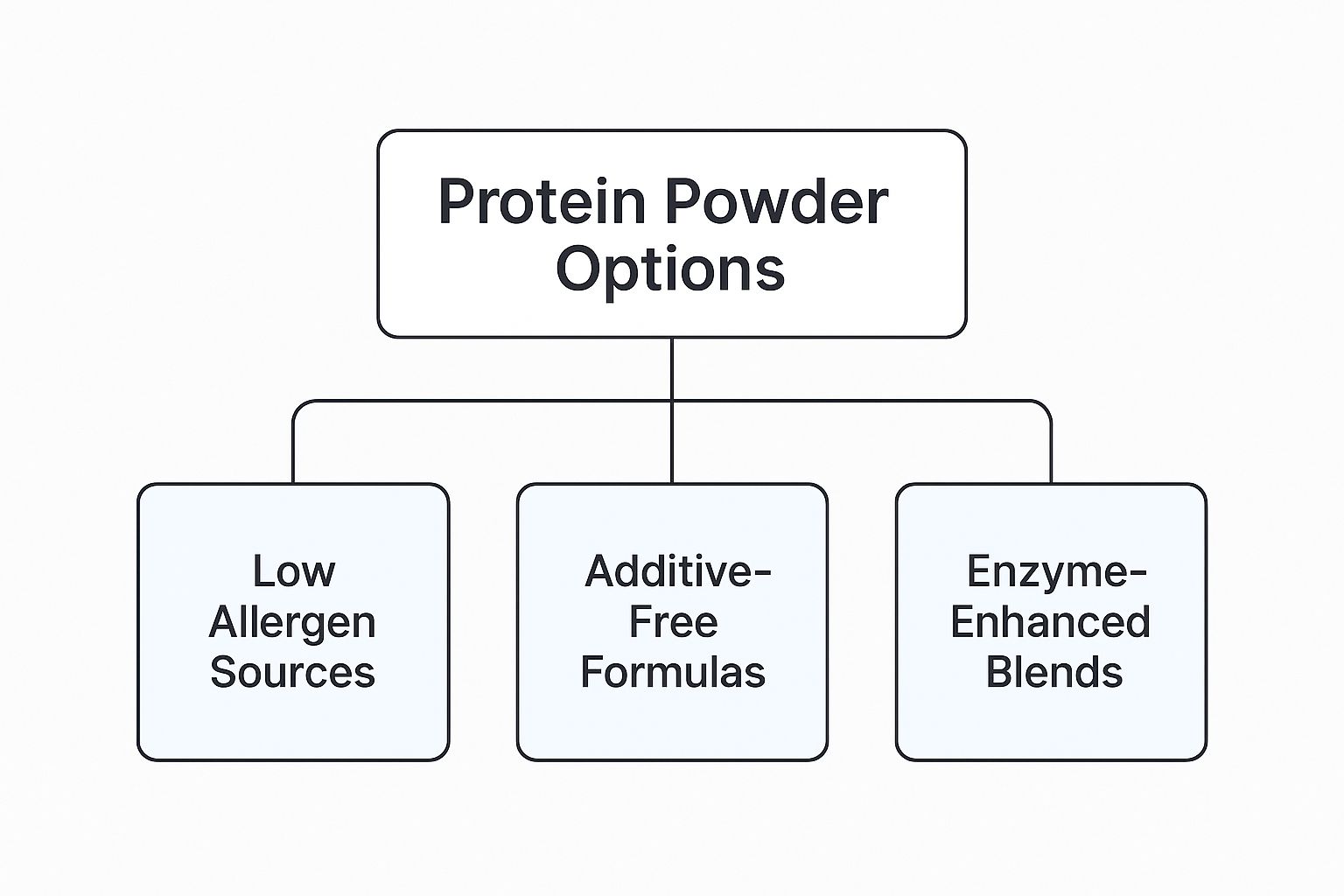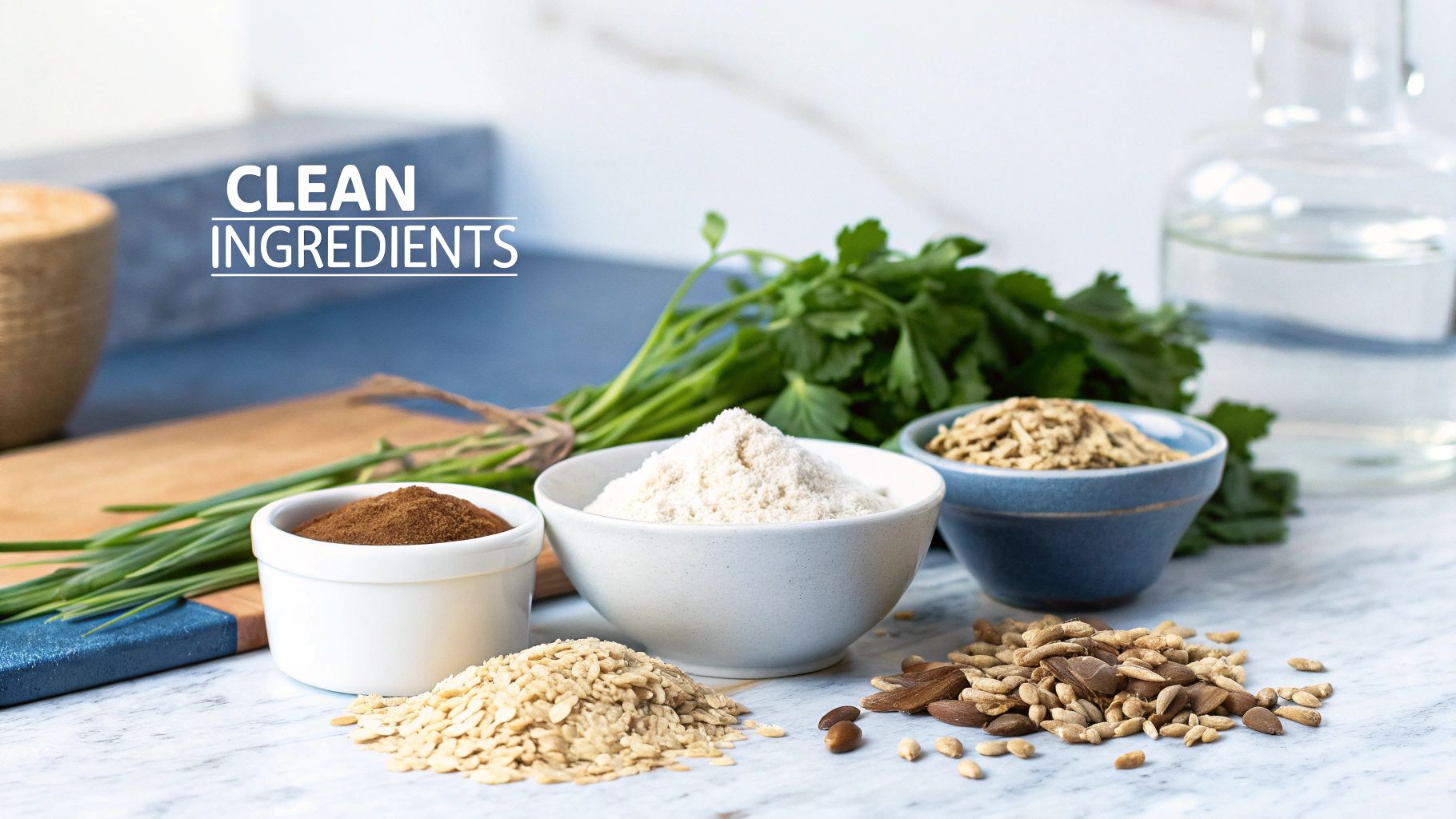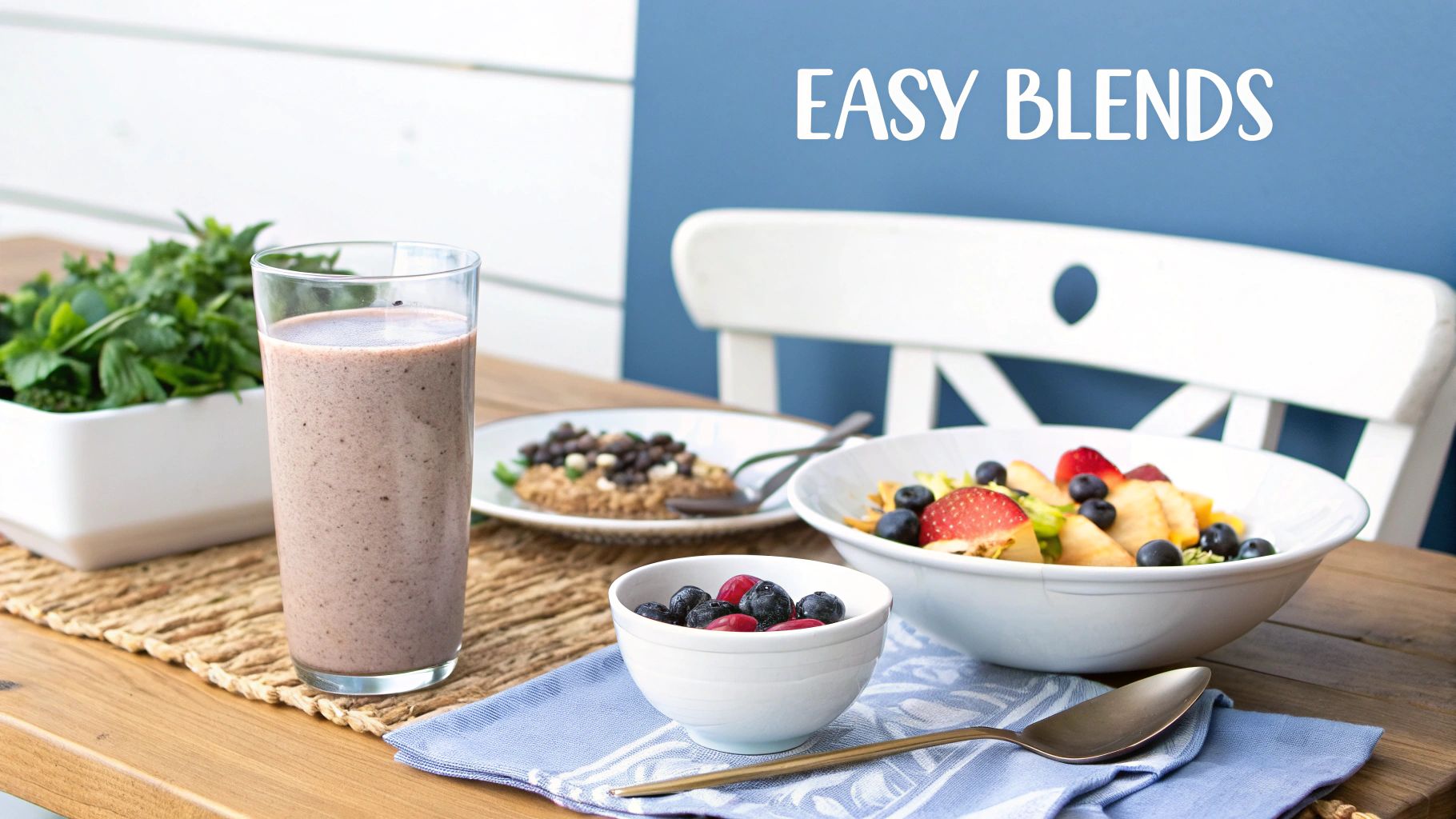Why Your Stomach Rejects Most Protein Powders

Imagine your gut is like a picky bouncer at a club. It wants to let in the VIP nutrients but keep out any troublemakers. For people with sensitive stomachs, this bouncer is extra strict, and certain ingredients in protein powders can set off alarms, leading to bloating, gas, and cramping.
One common culprit is lactose, found in whey protein concentrate. If you're lactose intolerant, even a small scoop can spell digestive disaster. Think of it like giving the bouncer a fake ID – it's not going to end well.
Another issue is artificial sweeteners like sorbitol and maltitol. While they might make your shake taste great, they can be poorly absorbed, upsetting the balance of your gut bacteria – like starting a fight in the VIP section.
Advancements in Protein Processing
Thankfully, things are changing. Whey protein isolates, for example, undergo extra processing to remove most of the lactose, making them easier to digest. It's like getting a VIP upgrade – smoother entry, no problems. The growing popularity of protein powder, shown by market research (Statista), is driving manufacturers to cater to sensitive stomachs. Some even include digestive enzymes to help break down the protein, like giving your gut a helpful assistant.
But lactose and artificial sweeteners aren't the only potential troublemakers. Some protein powders contain thickening agents like xanthan gum or guar gum. While harmless for many, these can ferment in the gut for some people, leading to gas and bloating – imagine an overcrowded dance floor, things are bound to get uncomfortable.
Similarly, high FODMAP ingredients (Fermentable Oligosaccharides, Disaccharides, Monosaccharides, and Polyols) can be problematic. These carbohydrates are poorly absorbed and can trigger digestive upset in sensitive individuals. It's like sneaking in a whole entourage with your VIP pass – the bouncer's not going to be happy. So, choosing a protein powder for a sensitive stomach requires a careful look at the ingredient list.
Decoding Labels: What Helps and What Hurts Your Stomach
If you've ever felt a little uneasy after your protein shake, it might be more than just a fleeting feeling. Understanding your gut health is the first step toward feeling truly nourished. Knowing the signs and symptoms of poor gut health can help you identify if this is a recurring issue. Choosing the right protein powder is a bit like selecting the right houseplant – you need to consider its specific needs and environment. One size doesn't fit all, especially when it comes to your stomach.
For example, the difference between whey concentrate and whey isolate can be significant. Whey concentrate often contains lactose, a sugar that can be tough on sensitive systems. Think of it like adding too much sugar to yeast – things can get a little bubbly and uncomfortable. Whey isolate, on the other hand, has most of the lactose removed, making it a gentler option.
This handy infographic offers a visual guide to choosing a protein powder that's kind to your gut:

As the infographic highlights, opting for low-allergen protein sources, avoiding unnecessary additives, and looking for enzyme-rich blends can make all the difference.
Even plant-based proteins can sometimes be problematic. Pea protein, while a popular choice, can be high in FODMAPs – types of carbohydrates that can trigger gas and bloating in some individuals. Imagine your gut as a peaceful garden; FODMAPs can be like an unexpected downpour, stirring things up and causing a bit of a commotion.
Understanding Additives and Their Impact
Artificial sweeteners, while tempting for their flavor-enhancing properties, can sometimes disrupt the delicate balance of your gut bacteria. Think of it like introducing an invasive species into a carefully curated ecosystem. The consequences can be unpredictable and potentially disruptive.
Thickening agents like xanthan gum and guar gum, while generally considered safe, can sometimes ferment in the gut, leading to discomfort. Imagine them as unexpected guests at a dinner party – not necessarily a problem, but they can certainly make things feel a little crowded.
Looking for Digestive Aids in Your Protein Powder
Now, not all additives are the enemy. Some protein powders come packed with helpful ingredients like digestive enzymes and probiotics. These are like the helpful staff at a bustling restaurant – they ensure things run smoothly and efficiently. Digestive enzymes help break down proteins, while probiotics support a healthy gut environment.
Natural flavorings, often derived from fruits and vegetables, are a welcome alternative to artificial sweeteners. They provide a refreshing taste without the potential for digestive upset. Think of it like enjoying a glass of freshly squeezed juice instead of a sugary soda – both offer flavor, but one is clearly a healthier choice.
To help you navigate the sometimes confusing world of protein powder ingredients, let's take a closer look at what makes a protein truly stomach-friendly.
Let's take a look at the table below to compare some common protein powder ingredients.
| Ingredient | Stomach-Friendly Rating | Why It Helps/Hurts | Best For |
|---|---|---|---|
| Whey Isolate | High | Low in lactose, reducing the risk of digestive upset. | Those sensitive to lactose. |
| Whey Concentrate | Medium | Can be high in lactose, potentially causing digestive issues. | Those without lactose sensitivities, who prioritize cost. |
| Hemp Protein | High | Low allergen potential, easily digestible. | Those with multiple food sensitivities. |
| Pea Protein | Medium | High in FODMAPs, which can cause gas and bloating for some. | Those who tolerate FODMAPs well and seek a vegan option. |
| Brown Rice Protein | Medium | Generally well-tolerated, but may not be as easily digestible as some other options. | Those looking for a grain-based vegan option. |
| Artificial Sweeteners | Low | Can disrupt gut bacteria balance. | Avoid if possible, especially with sensitive stomachs. |
| Digestive Enzymes | High | Aid in protein breakdown, supporting digestion. | Individuals with compromised digestive function. |
| Probiotics | High | Help maintain a healthy gut microbiome. | Those looking to support overall gut health. |
| Natural Flavorings | High | Gentle alternative to artificial sweeteners. | Those seeking a natural and less processed option. |
This table provides a quick overview of common protein powder ingredients and their potential impact on digestion. Remember, individual responses can vary, so what works well for one person might not be ideal for another.
By understanding these label nuances and considering your own body's unique needs, you can transform your protein powder experience from a source of discomfort to a valuable part of your wellness journey.
The Gentle Champions: Best Protein Types for Sensitive Digestion

Protein powders aren't one-size-fits-all, especially for those with sensitive stomachs. This guide explores the most digestion-friendly protein powder options, from refined whey to plant-based alternatives. Finding the right one requires understanding how different types interact with your digestive system.
Whey Protein Isolate: A Refined Approach
Whey protein isolate is a popular choice, known for its high protein content and quick absorption. Its gentle nature comes from the processing, which removes most of the lactose. Think of it like straining out the troublesome parts, leaving behind the pure, easily digestible protein. This minimizes the digestive upset some experience with standard whey concentrate.
Plant-Based Powerhouses: Hemp and Pea Protein
If you're exploring plant-based options, hemp and pea protein offer excellent alternatives for sensitive stomachs. Hemp protein is naturally low in allergens and offers a complete amino acid profile. It’s like a nutritional multivitamin, delivered in a gentle, easy-to-digest package. Pea protein is also a good option, but it needs a little more consideration. It can contain FODMAPs, which can be problematic for some. Opting for a pea protein isolate, however, significantly reduces these FODMAPs, making it suitable for many.
Rice Protein: The Unsung Hero
Rice protein is the often-overlooked hero of the protein powder world. Exceptionally gentle on digestion, it's hypoallergenic and free of common irritants. It quietly provides essential nutrients without causing a commotion in your gut. While it isn’t a complete protein on its own, it pairs well with other plant-based proteins to achieve a balanced amino acid profile.
Bone Broth Protein: Gut-Healing Benefits
Bone broth protein stands out with its potential gut-healing properties. It contains collagen and other amino acids that can support a healthy gut. Imagine it as providing internal nourishment for your digestive system. While more research is needed, anecdotal evidence suggests bone broth protein can be especially soothing for sensitive stomachs. For more on this, check out: Top 7 Best Protein Powder for Sensitive Stomach 2025.
Plant Protein Blends: The Power of Synergy
Combining different plant proteins is like assembling a winning team. Each protein contributes its strengths to create a more complete amino acid profile and a smoother digestive experience. These blends often include brown rice protein, pea protein isolate, and chia seeds, working together to create a well-rounded, stomach-friendly protein source. Choosing the right protein type can make all the difference in your digestive comfort, allowing you to enjoy the benefits of protein supplementation without the unwanted side effects.
The Rise of Stomach-Friendly Protein Solutions
The demand for protein powder for sensitive stomachs is growing. More and more people are realizing their digestive systems aren't fans of traditional protein supplements. This shift is changing how protein powder companies, both big and small, create their products.
Digestive-friendly protein isn't a niche product anymore; it's becoming mainstream. With more companies competing in this space, we're seeing true innovation. They're using gentler processing methods, adding digestive enzymes, and even making natural flavors that actually taste good.
Think of it like the craft beer explosion a few years back. Suddenly, there were tons of options beyond the usual light lagers. Similarly, the protein powder market is exploding with options designed for sensitive stomachs. This also points to exciting new developments down the road. Understanding these market trends helps consumers choose brands truly invested in digestive health.
For example, the global protein powder market (which includes products for sensitive stomachs) is booming. In 2024, the market hit $24.6 billion, and it's expected to reach $46.2 billion by 2034. That's a CAGR of 6.8%. This growth is driven by evolving diets, the increasing popularity of vegetarian and vegan lifestyles, and a growing awareness of health and wellness. Even in the more stable U.S. market, the demand for easily digestible protein powders is strong. The market is diversifying, making these specialized products increasingly available and giving consumers more choices. To learn more about these market trends, check out this report: Protein Powder Market Analysis.
This increased focus on digestive health has led to some major changes in how protein powders are made. Companies now realize that just offering protein isn't enough; it needs to be easy to digest. This has led to the development of protein powders with features like reduced lactose, added digestive enzymes, and gentler processing techniques. These changes not only offer more choices but also raise the quality standards across the entire protein powder industry.
By understanding these market shifts, you can choose protein powders that actually work for your body. This knowledge helps you make smart decisions and confidently navigate all the different protein powder options.
Real Stories: From Digestive Disasters to Protein Success

Finding the right protein powder can be a real struggle, especially if you have a sensitive stomach. It can feel like an endless cycle of trying new products, only to end up with digestive upset. Let's explore some real-world examples of how others have navigated this challenge and finally found protein powder success.
Think of Sarah, an avid runner who also happens to be lactose intolerant. For years, finding a protein powder that didn't cause issues felt impossible. Every attempt with standard whey protein concentrates resulted in bloating and cramping. Finally, she discovered whey protein isolate, a form of whey with the lactose removed. This simple change made all the difference, allowing her to reap the benefits of protein without the digestive distress.
Another story involves Mark, who manages IBS. He found that many protein powders, even plant-based ones, aggravated his symptoms. After some research, he learned about low FODMAP diets. This discovery led him to realize that specific ingredients in his protein powder, like inulin, were likely the triggers. Switching to a low FODMAP protein powder, combined with careful monitoring of his intake, allowed him to manage his IBS while still using protein to support his fitness goals. For a deeper dive into digestion-friendly protein sources, check out this helpful resource: Hemp Protein for Digestion: Everything You Need to Know.
Finding the Right Solution Takes Time and Patience
These stories highlight the importance of sticking with it. Finding the right protein powder for a sensitive stomach often requires some experimentation. Listening to your body and being open to trying different types and brands is key.
The growing demand for specialized protein powders is reflected in the market's expansion. Increased health awareness has driven substantial growth in recent years. The global market is expected to rise from $26.94 billion in 2024 to $28.82 billion in 2025, representing a CAGR of 7.0%. This growth is spurred by the expanding fitness industry and the ease of online shopping. Projections indicate the market will reach $39.39 billion by 2029, with a CAGR of 8.1%, suggesting an even greater focus on products tailored for sensitive stomachs. For a more detailed analysis of the protein powder market's growth, take a look at this report: Protein Powder Global Market Report.
Maria's experience exemplifies this trend. After surgery, her digestive system became incredibly sensitive, making it difficult to find a protein powder she could tolerate. As companies started prioritizing digestive health, she eventually discovered bone broth protein powder. This unique option provided the necessary nutrients without causing any discomfort. She credits this discovery as a significant factor in her recovery and continued well-being.
These are just a few examples of people successfully integrating protein powder into their lives despite having sensitive stomachs. Their journeys underscore the importance of careful research, ingredient selection, and mindful consumption for optimal digestive health.
Maximizing Comfort: Smart Preparation and Timing Strategies
Even the most stomach-friendly protein powder can sometimes cause digestive upset if not prepared and consumed thoughtfully. This section explores the key strategies for maximizing comfort, turning potential protein powder problems into smooth, satisfying experiences. We'll focus on preparation and timing, two often-overlooked factors that can significantly impact how your body handles protein.
The Impact of Water Temperature and Mixing Techniques
The temperature of your water, surprisingly, can play a role in how easily you digest protein. Room temperature or slightly warm water often mixes more readily and tends to be gentler on sensitive stomachs compared to ice-cold water, which can occasionally cause a bit of a shock. Think of it like activating yeast – warm water brings it to life, while cold water keeps it dormant.
Your mixing technique matters too. A shaker bottle is excellent for creating a smooth, clump-free mixture, preventing those pesky protein clumps that can be difficult to digest. Blending your protein powder into a smoothie with other ingredients creates a more complete mini-meal, further promoting digestion. It's like giving your stomach a head start on the breakdown process. If you've ever experienced bloating after using protein powder, you might find this article helpful: Protein Powder Bloating: Causes & Tips to Ease Discomfort.
Meal Timing and Portion Control
The timing of your protein intake is another piece of the puzzle. Some people find that a morning protein boost works wonders, while others prefer it post-workout to support muscle recovery. It's a bit like finding the ideal sunlight for different plants – some thrive in morning sun, while others prefer afternoon shade. Experiment and discover what works best for you.
Starting with a smaller serving size, such as half a scoop, and gradually increasing the amount as your body adapts is a smart strategy for avoiding digestive overwhelm. This allows your gut to get acquainted with the new protein source and minimizes the chance of discomfort. Think of it like introducing a new food to a baby – start small and gradually increase the portion.
Let's look at some optimal strategies for timing and preparation to help maximize digestive comfort:
Optimal Protein Powder Timing and Preparation Methods
| Timing | Preparation Method | Benefits | Best For |
|---|---|---|---|
| Morning | Smoothie with fruits and vegetables | Provides sustained energy, boosts metabolism | Jumpstarting the day, pre-workout fuel |
| Post-Workout | Shaker bottle with water or milk | Aids muscle recovery, replenishes nutrients | Replenishing after exercise |
| Between Meals | Mixed with yogurt or oatmeal | Curbs hunger, provides a protein boost | Managing cravings, sustaining energy levels |
| Before Bed | Warm milk with protein and calming spices (like cinnamon) | Promotes relaxation, supports overnight muscle repair | Improving sleep quality, aiding recovery |
This table offers a starting point. Remember, individual responses vary, so feel free to adjust these suggestions to fit your unique needs.
By strategically timing your protein intake and using the right preparation methods, you can greatly improve your digestive comfort and maximize the benefits of protein powder.
Advanced Strategies for Digestive Harmony
Beyond the basics, we can explore some more advanced strategies to enhance your protein powder experience. Protein cycling, alternating between different protein sources (like hemp, brown rice, or pea protein), can prevent digestive adaptation and broaden your nutrient intake. Think of it like crop rotation – it keeps the soil healthy and productive.
Incorporating digestive aids like ginger or peppermint alongside your protein powder can further soothe your stomach and promote healthy digestion. These natural remedies act like calming agents, smoothing out any digestive turbulence.
Lastly, consider adjusting your protein intake based on factors like stress levels and sleep quality. Stress and poor sleep can negatively impact digestion, so tailoring your protein consumption accordingly can contribute to your overall well-being. Just as a car performs best with proper maintenance, your body thrives when given the right fuel at the right time. These combined strategies offer a personalized approach to protein powder consumption, helping you achieve your fitness goals while maintaining digestive comfort.
Your Action Plan for Protein Powder Success
So, you're ready to find a protein powder that actually works with your sensitive stomach? It's not about luck; it's about having a smart strategy. Think of it like planning a road trip – you wouldn't just start driving without a map, right?
Phase 1: Careful Introduction and Observation
First, pick a protein powder based on what we've talked about – whey protein isolate, hemp, or a low-FODMAP plant protein blend are usually good starting points. Begin with a small serving, about half a scoop, mixed with room temperature water or lactose-free milk. It's like dipping your toe in the pool before jumping in.
Give it 24-48 hours and see how your body reacts. Are you experiencing gas, bloating, or any changes in bowel movements? If everything seems good, gradually increase your serving size until you reach your desired amount.
Phase 2: Expanding Your Protein Horizons
Found a protein powder that your stomach likes? Great! Now it's time to experiment. Try different flavors, mix it into smoothies or oatmeal, or see if taking it pre- or post-workout makes a difference. It's a bit like finding the perfect recipe – sometimes you need to adjust the ingredients.
Keeping a food and symptom journal can be really helpful during this phase. It's like having a detective's notebook – it helps you identify any subtle reactions and fine-tune your approach.
Phase 3: Long-Term Maintenance and Adaptation
Even if you've found the "perfect" protein powder, your body's needs can change. Stress, travel, or changes in your workout routine can all throw things off. That's why it's important to have backup options.
Think of it like having a spare tire in your car – you hope you never need it, but it’s good to have just in case. Having a list of alternative protein powders can save you from digestive distress if your go-to isn't available or starts causing issues. This is also a good time to explore other strategies like protein cycling or adding digestive aids.
Working with Healthcare Professionals
If you're still having digestive problems despite trying different protein powders and preparation methods, it's always a good idea to talk to a healthcare professional. They can help figure out if there are any underlying digestive conditions or sensitivities and give you personalized advice. It’s like taking your car to a mechanic when you can't figure out what's wrong.
By following this action plan, you can take the guesswork out of finding a protein powder that works for you. It’s all about building a sustainable routine that supports your health goals and keeps your stomach happy.
Ready to experience the difference a clean, digestive-friendly protein can make? Cantein offers premium plant-based nutrition built around the power of organic hemp protein, optimized for digestibility and bioavailability. Explore our range of protein powders and snacks designed to fuel your performance and support your gut health: Discover Cantein

